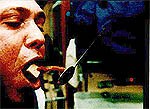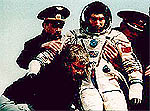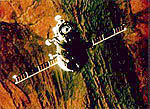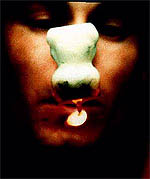 | Zero-gravity fun on Mir |
K I N O E Y E:
A Space Age Revolution
Andrei Ujica's Out of the Present
Andrew James Horton
Proudly proclaiming itself to be "the first film made in outer space,"
Andrei Ujica's Out of the Present (Germany/Russia, 1995) is ostensibly
a documentary about the space mission undertaken by Sergei Krikalev and
Anatoli Artsebarski. As well as being a showcase of breath-taking photography
and amusing anecdotal footage, the film reflects on the contrast between
political revolution and man's natural state.
When Sergei Krikalev waved goodbye to his family, he could scarcely
have imagined how much would have changed by the time he next saw them. His
launch to take him on a mission to the space station Mir took place on
18 May 1991 from the Soviet Union. When he returned to Earth on 25 March
1992, the country no longer existed.
 | Arriving to a hero's welcome |
His experience of the changes, narrated by his colleague Anatoli Artsebarski,
differ somewhat from those on the ground. The cosmonauts engage themselves
with their work, which often seems to be on the level of mundane household
tasks in a messy bachelor pad. Despite the impediment of zero gravity,
life continues as normal: the crew cut each other's hair, light candles
at Christmas and perform routine repairs, such as hacksawing pipes. Wires,
gadgets and ducts lie everywhere and computer parts seem to have been assembled
haphazardly The space station is a surprising mixture of rough and ready
technology and the plainly domestic. It's a far cry from the gleaming corridors
of the USS Enterprise.
 | Cosmonaut's eye view |
The bizarre normality of this life is contrasted with footage of riots
in Moscow, as the Soviet Union crumbles. Tanks roll onto the streets and
shots are fired. "We have a brand new control room with a brand new map,"
mission control radios the space station one day, "the Baltic States have
changed colour." However, to the cosmonauts the world looks the same, and whilst
they are fully informed about events below, they are totally removed from
and bewildered by the processes which are unfolding beneath them. When
Krikalev is asked by a journalist from ground control which of the changes
he finds most impressive, he pauses and says he does not understand the question.
The question is repeated, and after mumbling a few vague phrases, he opts for
the fact that it has just turned light.
 | Domestics made difficult |
The team's distance from the political turmoil is emphasised by the
slow, elegiac sequences of docking procedures and the earth's geographical
features, portrayed in what can only be described as hallucinogenic detail.
Clouds, ice sheets, coral reefs and rivers snaking through barren desserts
come under the telephoto lens of the station's camera and make the world
seem like it is, or at least should be, a tranquil place. Reflecting this
innocent view of the world, the crew return to almost child-like states,
indulging in lots of zero-gravity horseplay and pranks.
Ujica makes his philosophical intentions clear by using references to
the only two realistic contenders for the sci-fi cum existentialist
genre - Kubrick's 2001: A Space Odyssey and Tarkovsky's Soliaris.
The former being alluded to through the use of Strauss waltzes and the
latter by use of a clip from the closing sequence of the film.
Out of the Present defies categorisation and can be watched
on any number of levels: informative documentary, trippy visual orgy, tangential
political commentary on Russia or philosophical meditation. Whichever way
you approach it, the film is highly enjoyable.
Andrew James Horton, 10 May 1999
Click here for a review of Andrej Ujica and Farun Harocki's Videograms of a Revolution.
|  | |  |

![]()



